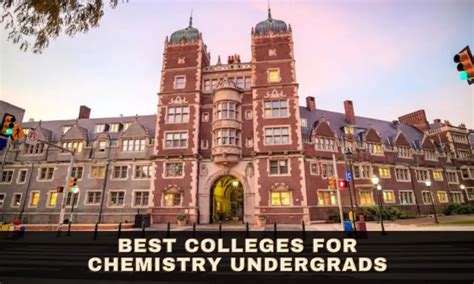Introduction

Chemistry is a fascinating field that explores the composition, structure, properties, and reactions of matter. It plays a vital role in various industries, including pharmaceuticals, materials science, and biotechnology. If you’re passionate about chemistry and aspire to excel in this field, choosing the right college is crucial. Here’s a comprehensive guide to the best chemistry colleges in the world, offering unparalleled opportunities and resources for aspiring chemists.
Top Chemistry Colleges in the World
1. Massachusetts Institute of Technology (MIT)**
- Location: Cambridge, Massachusetts, USA
- Acceptance rate: 4.8%
- Average SAT score: 1570
- Known for its renowned Chemistry Department, offering diverse research programs in organic, inorganic, physical, and analytical chemistry.
2. University of California, Berkeley (UC Berkeley)**
- Location: Berkeley, California, USA
- Acceptance rate: 12.4%
- Average SAT score: 1460
- Boasts the College of Chemistry, which is consistently ranked among the top chemistry departments globally, with exceptional research facilities and distinguished faculty.
3. Stanford University**
- Location: Stanford, California, USA
- Acceptance rate: 4.7%
- Average SAT score: 1540
- Offers a highly competitive Chemistry Department, known for its cutting-edge research in chemical biology, materials chemistry, and energy science.
4. Harvard University**
- Location: Cambridge, Massachusetts, USA
- Acceptance rate: 3.2%
- Average SAT score: 1570
- Renowned for its Department of Chemistry and Chemical Biology, which provides students with access to state-of-the-art facilities and world-leading research opportunities.
5. University of Cambridge**
- Location: Cambridge, United Kingdom
- Acceptance rate: 21.1%
- Average A-Level score: AAA
- Offers the Department of Chemistry, known for its exceptional teaching and research in a wide range of chemical disciplines, including theoretical chemistry, materials science, and catalysis.
6. University of Oxford**
- Location: Oxford, United Kingdom
- Acceptance rate: 17.5%
- Average A-Level score: AAA
- Houses the Department of Chemistry, renowned for its innovative research in organic chemistry, inorganic chemistry, and physical chemistry.
7. California Institute of Technology (Caltech)**
- Location: Pasadena, California, USA
- Acceptance rate: 6.9%
- Average SAT score: 1580
- Known for its Division of Chemistry and Chemical Engineering, which offers cutting-edge research opportunities in molecular biology, nanotechnology, and energy conversion.
8. Princeton University**
- Location: Princeton, New Jersey, USA
- Acceptance rate: 5.8%
- Average SAT score: 1560
- Hosts the Department of Chemistry, which is renowned for its research in physical chemistry, organic chemistry, and biochemistry.
9. Cornell University**
- Location: Ithaca, New York, USA
- Acceptance rate: 10.3%
- Average SAT score: 1490
- Offers the College of Arts and Sciences, which houses the Department of Chemistry and Chemical Biology, focusing on innovative research in chemical biology, materials chemistry, and catalysis.
10. University of Tokyo**
- Location: Tokyo, Japan
- Acceptance rate: N/A
- Average entrance exam score: 94%
- Houses the School of Engineering, which includes the Department of Chemistry, known for its research in catalysis, electrochemistry, and molecular spectroscopy.
Factors to Consider When Choosing a Chemistry College
- Research opportunities: Look for colleges with active research programs in areas that align with your interests.
- Faculty expertise: Consider the qualifications and expertise of the faculty members in your desired field of study.
- Facilities: Check the availability of state-of-the-art laboratories, instrumentation, and research centers.
- Reputation: Research the academic reputation of the college and its chemistry department.
- Location: Think about the location of the college and its proximity to industries or research centers.
Pain Points of Choosing a Chemistry College
- Competition: Chemistry programs can be highly competitive, so it’s important to showcase your academic achievements and research experience.
- Cost: Chemistry programs can be expensive, so it’s essential to research financial aid opportunities and consider your financial capacity.
- Program availability: Not all colleges offer the specific chemistry program or specialization you’re interested in.
Motivations for Choosing a Chemistry College
- Passion for chemistry: You’re genuinely interested in understanding the molecular world and solving complex chemical problems.
- Career aspirations: You desire a career in chemistry, including research, teaching, or the chemical industry.
- Intellectual challenges: You thrive on solving complex problems and advancing scientific knowledge.
Tips and Tricks
- Start early: Begin researching colleges in your sophomore or junior year of high school to give yourself ample time.
- Attend virtual or in-person campus tours: Get a firsthand experience of the college’s facilities and academic atmosphere.
- Reach out to the faculty: Contact professors in your desired field of study to learn about their research and potential opportunities.
- Seek mentors and peer support: Connect with current or former students in chemistry programs for guidance and advice.
- Prepare thoroughly: Study diligently for standardized tests, write compelling essays, and highlight your research experience.
Common Mistakes to Avoid
- Not researching thoroughly: Don’t make a hasty decision without exploring all your options.
- Only considering prestigious colleges: While prestigious colleges offer excellent programs, don’t overlook smaller or less-known institutions that may align better with your specific interests.
- Ignoring the cost: Be realistic about the financial implications of attending college and explore financial aid opportunities.
- Not diversifying your applications: Apply to a range of colleges to increase your chances of admission.
- Neglecting your extracurriculars: In addition to academic achievements, colleges value extracurricular activities that demonstrate your leadership, teamwork, and communication skills.
Conclusion
Choosing the right chemistry college is a crucial step in your academic and professional journey. By thoroughly researching the best colleges, considering your motivations, addressing pain points, and following these tips and tricks, you can make an informed decision that will set you on the path to success in the exciting field of chemistry.
